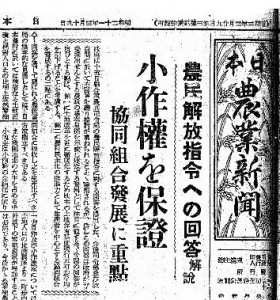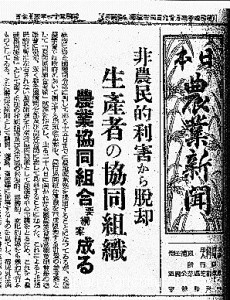Amendment by the initiative of GHQ
 “Farmers release command” (memorandum of understanding regarding agrarian reform) issued by MacArthur also ordered submission of the establishment plan of Nogyokyodokumiai (agricultural cooperatives), as the related measures of agrarian reform.
“Farmers release command” (memorandum of understanding regarding agrarian reform) issued by MacArthur also ordered submission of the establishment plan of Nogyokyodokumiai (agricultural cooperatives), as the related measures of agrarian reform.
One day, the answer submission deadline was imminent. A few leaders of the agricultural policy division of the Ministry of Agriculture and Forestry, such as Hiroo Wada, Agricultural Government answer specifically indicated these ideas of Ministry of Agriculture and Forestry. This was the first draft of the Ministry of Agriculture and Forestry regarding Nogyokyodokumiai (agricultural cooperatives) Law. Since then, planning negotiation with the Allied Forces General Headquarters (GHQ) regarding Nogyokyodokumiai (agricultural cooperatives) Law was started.

The article of the Nihon nogyoshinbun (The Japan Agricultural News) reporting that government answer and essence draft (second draft) was created but to be refused by GHQ.
Features of the first draft were as follows;
1) strong color of production cooperatives, 2) organized nogyo-jikko-kumiai (farming union) as executing organizations, 3) Immobilized on a fixed frame such as the levels of nation, prefectures, municipalities, and villages, 4) compulsory subscription system of cooperatives members, 5) less stringent attitude toward nogyokai.
Against this proposal, at first GHQ had no particular reaction. Because it was the time when the agrarian reform had top priority, GHQ might have been too busy to respond it.
The Ministry of Agriculture and Forestry added some modification in the basic ideas that have been piled on the first draft, and approved it as yoko (essence)(the second draft) at Cabinet meeting in June 1946. In September the ministry finished the printing. It was believed to be submitted to the 90th Imperial Diet together with the agrarian reform bill. However, submission to the Diet was suspended. The Ministry of Agriculture and Forestry was facing two big bills. So, the ministry’s burden was taken into account. Submission of Nogyokyodokumiai (agricultural cooperatives) Law was delayed until the next National Assembly (the first Diet under the new Constitution).
Requested “cooperatives for the farmers”
Since submission was postponed, Ministry of Agriculture and Forestry decided to listen to the opinions of all parties concerned until next submission. Then GHQ interrupted. GHQ commanded the stop of the distribution of the bill.
In October 1959, former bureaucrats involved in enactment of Nogyokyodokumiai (agricultural cooperatives) Law, such as Takekazu Ogura( 1910 ~ 2002 ), agricultural policy manager, opened the roundtable discussion hosted by the Institute of cooperatives management research Inc., and discussed on the theme of “process and problem regarding enactment of Nogyokyodokumiai (agricultural cooperatives) Law.” In this, one person who was bureaucrat said “GHQ changed its policy. Therefore, distribution of the bill even came to be stopped.” But there is no description about the contents of the policy change. They said that “GHQ requested discussion on future planning of the bill.” The second draft was rejected.
After that negotiations continued. The Ministry of Agriculture and Forestry created draft of agricultural policy section (third draft). However, it came to be seen and difficult to achieve the policy that “the control functions of nogyokai (agriculture institution) should be succeeded to nogyokyodokumiai (agricultural cooperatives).” GHQ thought that, the nogyokyodokumiai (agricultural cooperatives) had to be “cooperatives of the farmers, by farmers, for the farmers,” based on US democracy.
Dr. Schenk, director of the division of Natural Resources of GHQ, in charge of agriculture, invited Agriculture Minister Wada, expressed the basic policy of the Nogyokyodokumiai (agricultural cooperatives) Law. It was intended to press for significant modifications to the policy of Japanese government. The main points were as follows;
1) emphasis of liberal cooperatives principle, 2) freedom of subscription system, 3) limited ordinary memberships and establishment of associate member system, and so on.
Soon, the nogyokyodokumiai (agricultural cooperatives) bill created by Division of Natural Resources of GHQ (first draft of GHQ) was also shown. At the beginning of the negotiation, the Japanese side presented the bill and received the modification by GHQ. But since then, GHQ created the bill and Japanese side received.
At the roundtable discussion, former bureaucrat said, “The Japanese government did not immediately revise after indication of the memorandum by Director Schenk, revised partially ,and submitted the bill several times. It might have caused frustration on GHQ.”
reference = Kentaro Uchikoshi and Takekazu Ogura “Establishment process of the Nogyokyodokumiai (agricultural cooperatives) Law” JC Research Institute, “Nogyokyodokumiai (agricultural cooperatives) system history, the first volume” JC Research Institute, Keisuke Otake ” Phantom of the flower, life of Hiroo Wada” Agriculture and Forestry Statistics Publishing Inc., Tsukuru Akeda “Nogyokyodokumiai (agricultural cooperatives) Law” economic laws and regulations Research Institute, Tatsuo Yonesaka ”Introduction of Nogyokyodokumiai (agricultural cooperatives) history (fourth revised)” National cooperative publishing

